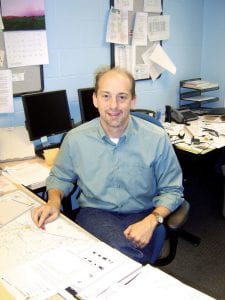Rocks. Rocks and hills. Rocks, hills, and trees. Rocks, hills, trees, and clay. Rocks, hills, trees, clay, and water. They make Cook County Highway Engineer David Betts’ job interesting. The terrain, he said in an interview with the Cook County News-Herald,
“is one of the reasons I was really excited about coming up here.”
Betts got here via Wisconsin, Iowa, and the Twin Cities, working most recently for Short Elliot Hendrickson Inc. as the consulting engineer for the City of Vadnais Heights. In his former locations, soils were made of soil, not rock. “That’s the biggest challenge of the roads,” he said about the work of the Cook County Highway Department.
When he and his wife Dori moved to Cook County at the end of June, Betts asked where people get the top- soil for their lawns around here. “We don’t have topsoil,” he was told.
Betts gives his staff of about 20 rave reviews. “[Maintenance Supervisor] Russ [Klegstad] is fantastic,” he said. “Thecrews are great. Theofficestaff is really helpful.”
Betts is used to (relatively) small town life in the middle of the woods. He grew up in Wisconsin Rapids, a paper town in Central Wisconsin. His dad was a civil engineer who ended up in the building industry. After Betts graduated from Michigan Tech in 1992 with a B.S. in civil engineering, he took jobs with a software company in Dubuque, Iowa and a private consulting firm in Beloit, Wisconsin. While in Beloit, he did some “interesting” work for a National Guard base. “I learned that jet propulsion fuel cannot touch asphalt or it will spontaneously combust.”
The engineer’s job
What does the county highway engineer do all day? If he’s not engineering the reconstruction of a road or guiding his engineering staff, he might be talking to Russell Klegstad about who on the maintenance crew is going where to do what with which equipment. Or he might be trying to secure funding for a project that needs to get done or reporting on how money has been spent.
“It’s a lot of management,” Betts said. “It’s a lot of dealing with funding. If we don’t get funding, we don’t get to do what we really need to do. We just chase the problem. Roads are very, very expensive.” Cook County depends on both state and federal dollars to keep its roads maintained. Some county roads or portions of them get a chunk of the state’s gas tax revenue through the “state-aid” funding stream.
Keeping the funding coming takes a lot of paperwork. “Paperwork, paperwork, paperwork,” Betts said. “Everything’s paperwork. That’s just the nature of the beast.”
A gas tax hike a couple of years ago helped bring dollars for road work, Betts said, but people have been driving less, which generates fewer gas tax dollars. When gas is cheaper, people drive more, thus using more gas, which brings in more funding for roads, which in turn need more repair because of the wear and tear on them from all that traveling. “If everybody went to electric cars,” Betts said, “we’d have no money for roads except for local dollars from your levy.”
Setting priorities
While the road crew focuses on maintaining and repairing county roads, the department’s four engineering techs keep busy with design work in the office, surveying project sites, and supervising projects as they are being done. They make sure mixtures are correct – salt and sand for keeping winter roads clear and gravel for maintaining and reconstructing roads in summer.
How do Betts and his crew set priorities, and how do they address fairness in grading, putting down calcium chloride, and brushing ditches? “We try to take care of all the roads and do it in an organized fashion,” Betts said. They have been trying to get caught up on clearing ditches, an initiative started by Russell Klegstad. This not only helps prevent collisions with deer, it lets more sunlight onto the roads, which reduces ice and helps the roads last longer. This last summer they worked on getting brush out of the ditches up the Gunflint Trail. Once that is done, the ditches will only need to be mowed. “You should never let trees grow in your ditches,” Betts said. The landscape will not be altered dramatically, however. “We aren’t going to turn things into an urban environment,” he said.
Betts welcomes input from the community. He wants to know what people are seeing and wanting. The county board recently voted to discontinue pursuing a joint maintenance facility with other governmental units, despite the fact that the county maintenance garage is so tight for space that they keep records in the men’s room. Thejob is not about him, Betts said. It’s about making a good place for people to work and making sure people have decent roads so they can get where they need to go. “We’re trying to listen to people. If you don’t listen you can’t learn anything.”
Feeling at home
This fall, Betts was tickled to be able to go out hunting in the morning and be back home for breakfast a couple of hours later. When he can find the time, he also enjoys other outdoor activities such as fishing and golfing. “All that stuff that I haven’t done,” he said.
Living in Cook County has been a culture shock in a good way, Betts said. He enjoys the feeling of safety here. “People have been so nice and friendly and welcoming.” His wife Dori, a paralegal who previously managed a law firm, has been getting to know the community as well. “Rumor has it that they call her by name at the grocery store.”
David and Dori are happy to be here. “It just feels like home.”



Loading Comments